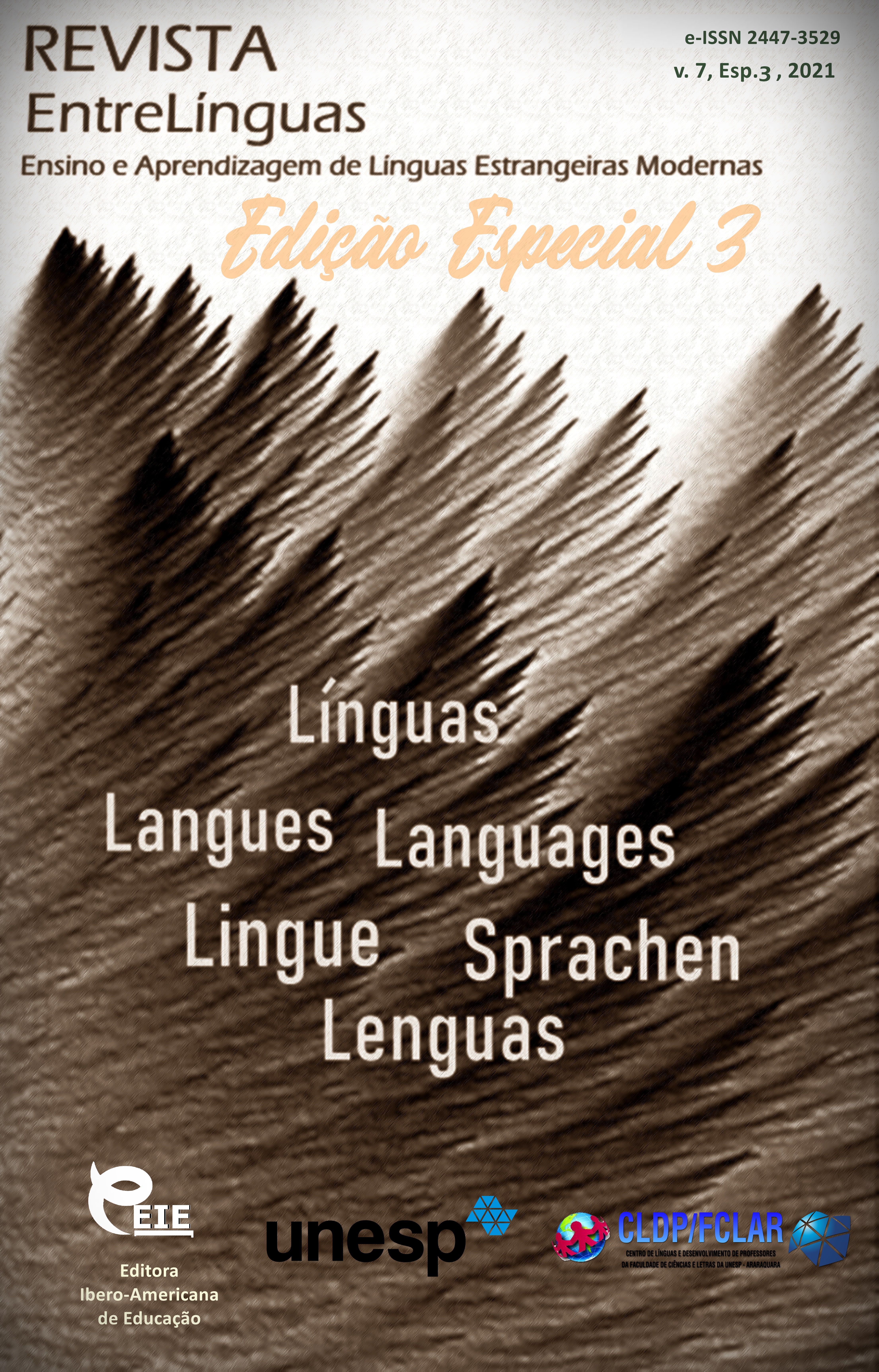Corpus-based approach to forming communication skills in the use of idioms
DOI:
https://doi.org/10.29051/el.v7iesp.3.15702Keywords:
Corpora, Concordance, Language, Idiom, Learning, Communication skillsAbstract
The paper presents a corpus-based approach to forming communication skills which has been widely accepted nowadays. The methodological apparatus of corpus linguistics is a promising tool for language learning. The purpose of the present research is to study the potential of the Tatar National Corpus in forming communication skills in the use of Tatar idioms. Corpus-based approach has many applications in language learning from extending teaching techniques to arousing learners’ curiosity and improving communication skills. Traditionally, idioms are considered to be fixed expressions, which have a meaning that is not immediately obvious from looking at the meanings of the parts. It has become evident over the past decades that all sorts of creative modifications of idioms are quite frequent and can be varied. Most idioms are not totally opaque. Thus, they are open to the corpus-based approach. Moreover, idioms are typically based on metaphors, and metaphors as mental images are easily modifiable. The native speakers adapt them, combine them and can change parts of them. Undoubtedly, a corpus presents an opportunity to learn the authenticity of the idioms used in reality, without somebody’s selection or previous interpretation. Learning a foreign language on the basis of corpus data allows students to analyze lexical, grammatical and syntactical variations of idioms, to comprehend their semantics, and explore new variants of idioms, unrecorded in dictionaries yet.
Downloads
References
ABDULLINA, L. R. Lexical and semantic potential of emotionally expressive sentences in the tatar and french languages. Journal of Language and Literature, v. 6, n. 2, p. 50-54, 2015.
ASTON, G. Corpora in language pedagogy: matching theory and practice. In: COOK, G.; SEIDLHOFER, B. (Eds.). Principle and practice in applied linguistics: studies in honour of H.G. Widdowson. Oxford: Oxford University Press, 1995. p. 257-270.
GRANGER, S. International Corpus of Learner English: a new resource for foreign language learning and teaching and second language acquisition research. TESOL Quarterly, v. 37, n. 3, p. 538-546, 2003.
GRIGALIŪNIENĖ, J. Corpora in the classroom. Vilnius University, 2013. 83 p.
GROLMAN, M. B.; DEPUTATOVA, N. A.; BIKTAGIROVA, Z. A. Experimental results on approbation and adaptation of training courses of Pearson Longman publishing group. Journal of Language and Literature, v. 7, p.181-184, 2016.
JOHNS, T. From printout to handout: grammar and vocabulary teaching in the context of data-driven learning. In: JOHNS, T.; KING, P. (Eds.). Classroom concordancing. Birmingham: University of Birmingham, 1991. p. 27-45.
KONDRATEVA, I.; IBATULINA, L. Training of scientific language through discoursive analysis. Journal of Organizational Culture, Communications and Conflict, v. 20, n. esp., p. 38-44, 2016.
LAMY, M.; MORTENSEN, H. Using concordance programs in the modern foreign languages classroom. Module 2.4. In: DAVIES, G. (ed.). Information and Communications Technology for Language Teachers (ICT4LT). Slough: Thames Valley University, 2012. Available: http://www.ict4lt.org/en/en_mod2-4.htm. Access: 10 Dec. 2020.
LEECH, G. Teaching and language corpora: a convergence. In: WICHMANN, A. et al. (eds.). Teaching and language corpora. London: Longman, 1997. p. 1-23.
LINDQUIST, H. Corpus linguistics and the description of english. Edinburgh: Edinburgh University Press Ltd., 2009. 241 p.
MORDVINOVA, A. R.; SADYKOVA. A. G.; ZAKIROVA, L. R. The Transformantion of the quebeckers internet discourse (on the material of conneriesqc.com account on facebook). Journal of Organisational Culture, Communications and Conflict, v. 20, n. esp., p. 192-194, 2016.
PLUNGYAN, V. A. Lecture: why modern linguistics should be linguistics of corpora. 2009. Available: http://www.polit.ru/lectures/2009/10/23/corpus.html. Access: 10 Dec. 2020.
SABIROVA, D. R. Comprehension of the english national character in building professional linguistic culture. Journal of Educational and Social Research, v. 9, n. 3, p. 101-106, 2019.
SINCLAIR, J. The search for units of meaning. Textus (IX), v. IX, n. 1, p. 75-106, 1996.
SUBICH, V. G.; SHANGARAEVA, L. F.; ZAKIROVA, L. R. Improvement of the English Language by means of authentic texts. Journal of Language and Literature, v. 7, n. 2, p. 257-261, 2016.
Published
How to Cite
Issue
Section
License

This work is licensed under a Creative Commons Attribution-NonCommercial-ShareAlike 4.0 International License.
Os manuscritos aceitos e publicados são de propriedade da Revista EntreLínguas. Os artigos publicados e as referências citadas na Revista EntreLínguas são de inteira responsabilidade de seus autores.
Transferência de direitos autorais – autorização para publicação
Caso o artigo submetido seja aprovado para publicação, já fica acordado que o(s) autor(es) autoriza(m) a UNESP a reproduzi-lo e publicá-lo na EntreLínguas, entendendo-se os termos “reprodução” e “publicação” conforme definição respectivamente dos incisos VI e I do artigo 5° da Lei 9610/98. O artigo poderá ser acessado pela rede mundial de computadores (Internet), sendo permitidas, a título gratuito, a consulta e a reprodução de exemplar do artigo para uso próprio de quem a consulta, desde que haja a citação ao texto consultado. Essa autorização de publicação 328 EntreLínguas, Araraquara, v. 1, n .2, p. 323-328, jul./dez. 2015 não tem limitação de tempo, ficando a UNESP responsável pela manutenção da identificação do(s) autor(es) do artigo. Os artigos publicados e as referências citadas na Revista EntreLínguas são de inteira responsabilidade de seus autores.











